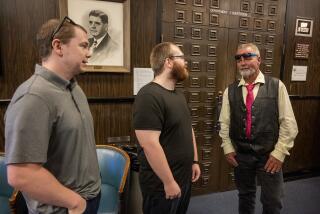Dally’s Despicable Nature Was a Deciding Factor, Analysts Say
- Share via
With little hard, direct evidence, jurors convicted Michael Dally of the brutal 1996 murder of his wife partly because he is such a despicable guy, legal analysts said Monday.
“Prosecutors often say that if you have to choose between strong evidence or a bad defendant, they would choose the latter,” said defense attorney Kevin DeNoce, a former prosecutor who once worked the Dally case.
“Michael Dally was not only bad,” DeNoce added, “but bad in your face. He wears his haughty, unrepentant, seedy nature on his face with relish. And it’s hard to defend a client like that.”
Several lawyers also said they would not be surprised if the same jurors recommend a death penalty for Dally. The penalty phase of the trial begins Monday.
“The jury verdict says they think he was involved from the beginning to the end of the murder,” said Laurie Levenson, associate dean at Loyola Law School. “If I were a defense counsel, I would be plenty worried right now.”
During the trial, prosecutors depicted the 37-year-old Dally as a dead-end, drug-using grocery clerk who preyed on weak women, bought sex from prostitutes and finally convinced one of his conquests--Diana Haun--to savagely kill his wife.
His own attorney described Dally in final arguments as a “rotten guy” who treated his wife abominably, but who at worst was guilty of hiding the murder from police after Haun told him about it.
Despite the absence of physical evidence linking him directly to the crime, however, jurors found Dally guilty of plotting the kidnap and slaying of his longtime wife, Sherri.
“Cases are either judged on the evidence or on the defendant,” said DeNoce who as a deputy district attorney had an insider’s view of evidence for the first months of the case. “And unfortunately for the defense in this case, the jury relied more on the character of the defendant than the evidence.”
Other lawyers said the evidence against Dally was solid and compelling. He left no fingerprints or blood stains, but it was Dally’s conduct in the days after his wife’s disappearance that struck the most telling chord.
*
“I would speculate that what did him in was his own conduct, his own comments, and his own callous attitude--that went beyond indifference--that he demonstrated in the wake of his wife’s disappearance,” said George Eskin, a former prosecutor and defense attorney.
“It was not the normal behavior of a man whose wife and the mother of his children has disappeared,” Eskin said. “He would not join in the search. He calls his mother-in-law that same day and says his wife has been ‘snatched.’ I’m sure it didn’t help that he was discovered with Ms. Haun a day and a half later in their underwear.
“Everything he said and did,” Eskin added, “seemed to feed into the prosecution theory that there was some kind of understanding, some kind of conspiracy, to dispose of this obstacle to them.”
Indeed, attorneys praised the prosecution’s meticulous stitching together of a circumstantial case that was far less solid than the one that ended in Haun’s murder conviction in September.
*
“This case was a puzzle. There was no single piece of evidence that prosecutors could point to to prove Michael Dally guilty,” DeNoce said. “It just goes to show that a capital case can be purely built and based on circumstantial evidence.”
Deputy Dist. Attys. Lela Henke-Dobroth and Michael Frawley “did a masterful job of weaving the evidence into a big picture,” Eskin said.
Despite circumstantial evidence, attorneys said they do not think jurors will hesitate to impose a death sentence on Dally.
“He not only betrayed his wife, he betrayed his children,” Eskin said. “It sounds to me like this is the kind of case the death penalty is designed for.”
More to Read
Sign up for Essential California
The most important California stories and recommendations in your inbox every morning.
You may occasionally receive promotional content from the Los Angeles Times.













